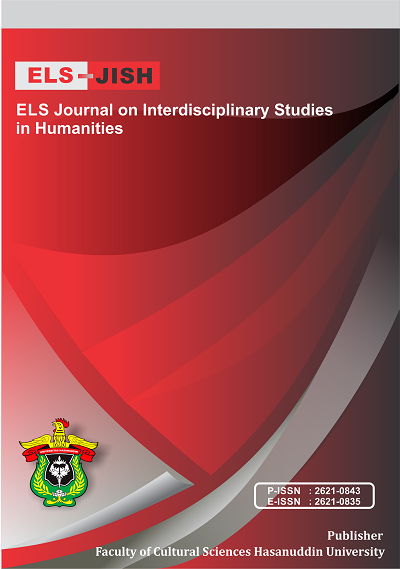A Lexical Study of EFL Reading Materials in Developing English Competencies 3
DOI:
https://doi.org/10.34050/elsjish.v6i2.27580Keywords:
EFL Reading Material, Lexical Item, Vocabulary AcquisitionAbstract
A textbook is one of the essential learning sources for EFL/ESL learners, especially in vocabulary acquisition. It must be evaluated and selected when performing eight categories (aims and approaches, design and organization, language content, skill, topic, methodology, teacher’s book, and practical considerations). The language content category evaluates whether the EFL/ESL materials used in the learning process for vocabulary teaching are adequate in terms of vocabulary quality and range, the emphasis placed on vocabulary development, and strategies for individual learning. It is possible to say that learning a language is fundamental and so deeply dependent on vocabulary. This study is aimed to identify the number of lexical units found in the reading materials of an EFL textbook, Developing English Competencies 3, and to measure the sufficiency of lexical units found in the reading materials of the textbook in vocabulary quantity and range by comparing to the general frequency list, Michael West’s GSL (1953). The book became the object of this descriptive quantitative study with the specific linguistic field, corpus. A computational tool, RANGE, and FREQUENCY, designed by Nation (2001) and then developed by Heatley, Nation, and Coxhead (2002) was applied to count the lexical units easily. It was found that the book was clearly imbalanced concerning the amount of 5,064 tokens and 1,434 types with the distribution of 57.1% in range one, 14.9% in range two, and 5.2% in range three throughout three ranges described by Nation. In summary, the book didn’t propose the foreign learners’ expectations and necessary opportunities for automatizing vocabulary. Besides, it is also limited to offering all possible comprehensive situations, which the students may find in real life
References
Criado, R. (2009). “The Distribution of the Lexical Component in ELT Coursebooks and its Suitability for Vocabulary Acquisition from a Cognitive Perspective. A Case Study. International Journal of English Studies, 9(3), 39-60.
Farisatma, N., Nasmilah, & Rahman, F. (2017). Applying group work to improve student’s grammar achievements. Imperial Journal of Interdisciplinary Research-IJIR, 3(5), 1971-1975.
Febriana, A. D., Saiful , J. A., & Ro’ifah. (2022). Microsoft 365 Digital Classroom Tools and the Development of English Teachers’ Self-Efficacy in ICT. English Education:Journal of English Teaching and Research, 7(1), 19-30. https://doi.org/10.29407/jetar.v7i1.17784
Hamsia, W. (2021). Online Collaborative Approach Through Edmodo For Teaching Explanation Text In Covid-19 Pandemic. Proceeding Umsurabaya, 1(1).
Hasnia, H., Andini, C., Tahir, M. D., Hunaeni, H., Zulfikariandi, Z., & Muslimin, M. T. (2022). The Ability of 1st Class Students of SMAN 11 Enrekang to Arrange Verbal and Nominal Sentences. ELS Journal on Interdisciplinary Studies in Humanities. 5(3), 539-550.
Indarwati, I., Nurhayati, N., Lukman, L., & Sahib, H. (2022). The Language Attitude of Gantarang Community Towards Konjo Language: A Case Study in the Realm of Family and School. Journal of Advanced English Studies, 5(1), 31-36.
Jannah, A., Wijaya, S., & Ro'ifah, R. (2022). Learning Connected Speech by Pronouncing Song Lyrics: Students' Perspective. Jo-ELT (Journal of English Language Teaching) Fakultas Pendidikan Bahasa & Seni Prodi Pendidikan Bahasa Inggris IKIP, 9(1), 13-28. doi:https://doi.org/10.33394/jo-elt.v9i1.5156
Junaidi, J., Hamuddin, B., Julita, K. , Rahman, F., & Derin, T. (2020). Artificial intelligence in EFL context: rising students’ speaking performance with Lyra virtual assistance. International Journal of Advanced Science and Technology Rehabilitation, 29(5), 6735-6741.
Khasanah, U., Ro’ifah, R., & Wijaya , S. D. (2023). Speaking Content Analysis in Indonesian Vocational High School English Textbook. International Journal of Language Teaching and Education, 6(2), 5-13. https://doi.org/10.22437/ijolte.v6i2.22476
Lodhi, M. A., Farman, H., Ullah, I., Gul, A., Tahira, F., & Saleem, S. (2019). Evaluation of English Textbook of Intermediate Class from Students' Perspectives. English Language Teaching, 12(3), 26-36.
McCarthy, Andrew, & Carstairs. (2002). An Introduction to English Morphology: Words and their Structure, Edinburgh: Edinburgh University Press.
Mokoginta, K., Arafah, B., Rahman, F., & Abbas, H. (2021). Indonesian Women as Reflected in an English Textbook Used in Indonesia. IJASS, 4(6), 323-337.
Nation, I. S. P., (2001). Learning Vocabulary in Another Language, Cambridge: Cambridge University Press.
Prayitno, M. (2011). Look Ahead 2: Its Appropriateness for Internationally Standardized School. (Magister Thesis, Universitas Negeri Surabaya).
Rahman, F., & Weda, S. (2019). Linguistic deviation and the rhetoric figures in Shakespeare’s selected plays. XLinguage" European Scientific Language Journal", 12(1), 37-52.
Read, J. (2000). Assessing Vocabulary, Cambridge: Cambridge University Press.
Ro’ifah, & Hamsia, W. (2022). Need Analysis on Lexical Units of Reading Material in An ELT Textbook. ELS Journal on Interdisciplinary Studies in Humanities, 5(4), 750-759. https://doi.org/10.34050/elsjish.v5i4.24842
Seddigh, F. (2012). Vocabulary Learning Strategies of Medical Students at Shiraz University of Medical Sciences. English Language Teaching, 5(2), 160-173.
Sukmawaty, Rahman, F. F., & Andini, C. (2022). Covid-19 Pandemic and Axiology of Communication: A Study of Linguistic Phenomena. IJISRT, 7(4), 1079-1087.
Setiawan, I. (2006). Analysis on Reading Texts for the Seventh Grade SMP English Textbook. Unpublished Master Thesis. Surabaya: UNESA, 2006.
Richards, J. C. (2017). Curriculum development in language teaching. Cambridge: Cambridge University Press.
Downloads
Published
How to Cite
Issue
Section
License
Copyright (c) 2023 Ro'ifah, Rosiana Silfani

This work is licensed under a Creative Commons Attribution-ShareAlike 4.0 International License.






